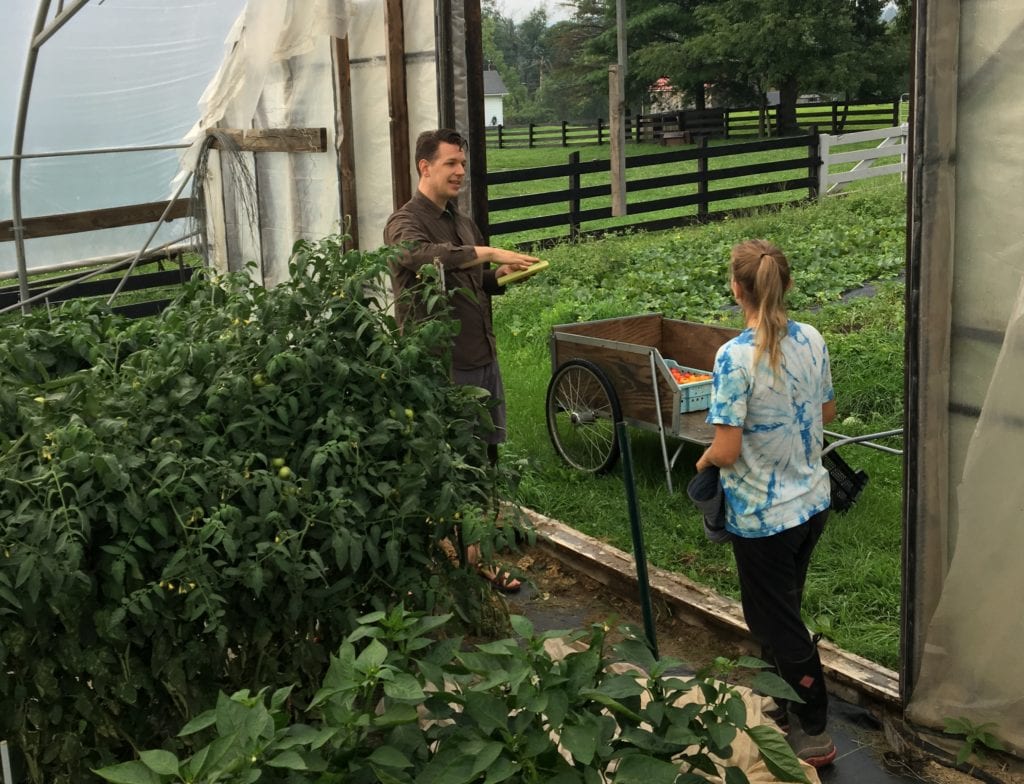
Diversified Vegetable Apprenticeship Manager Dan Dalton meets with Apprentice Jess Hermanofski at host farm Plowshare Produce, an organic CSA farm in Huntingdon County, PA
We developed Diversified Vegetable Apprenticeship to provide a guided pathway for training aspiring vegetable farmers to manage or start a farm while also meeting the employment needs of established farms.
During a time when 75 percent of beginning and aspiring farmers under the age of 40 in the U.S. did not grow up on a farm, farmer training programs are more important than ever. Without the traditional transfer of knowledge between parents and children, aspiring farmers need hands-on opportunities to learn the intricacies of stewarding land, tending crops and running a financially viable business.
Apprenticeship is a tried-and-true model of learning that has trained workers for careers in skilled trades for centuries. Today, a diverse array of state- and federally-registered apprenticeships are available for more than 1,000 occupations—from carpentry and plumbing, to dentistry and computer programming.
Yet, none existed for farmers until 2011 when a group of dairy farmers in Wisconsin founded Dairy Grazing Apprenticeship to help stem the tide of farmland loss and introduce a new generation to dairy grazing. PASA partnered with Dairy Grazing Apprenticeship in 2016 to administer the national program in Pennsylvania and nearby states and soon thereafter began developing a companion apprenticeship for vegetable farmers.
“We worked with an instructional design expert, the Pennsylvania Department of Labor and Industry, and beginning and seasoned farmers from 19 of our member farms to build the curriculum from the ground up,” said Dan Dalton, Diversified Vegetable Apprenticeship manager.
The curriculum trains apprentices in core competencies from soil fertility and irrigation, to marketing and business administration. Apprentices receive more than 2,700 hours of on-the-job training at an established farm and complete more than 200 hours of related technical instruction over the course of two seasons. Plus, apprentices are paid an hourly wage that increases as they advance their skills.
And while the program is designed to cultivate new farmers, it’s also designed to benefit farm owners and operators who often find it challenging to find skilled and reliable workers. Approved host farms can access a pool of pre-qualified apprentice candidates who are invested in farming as a career.
“We want to make sure that the program meets both the training needs of the apprentices as well as the labor needs of the farmers who host them,” said Dalton. “We provide ongoing support by monitoring the progress apprentices and host farmers make as they work through the 18-month curriculum and provide additional resources as needed.”
“This is a major milestone in ushering in the next generation of Pennsylvania’s farmers,” said PASA Executive Director Hannah Smith-Brubaker, who also co-owns and operates an organic vegetable farm with her family in Mifflintown. “After completing a state-registered apprenticeship, graduates will be able to clearly demonstrate their competencies, better positioning them for work in the field and accessing capital and land opportunities.”
Interested in becoming an apprentice or hosting one? Find out more here.
Diversified Vegetable Apprenticeship is funded by the Hillman Foundation and more than 100 business and individual donors who invested in the program’s curriculum development process as part of a fundraising campaign.